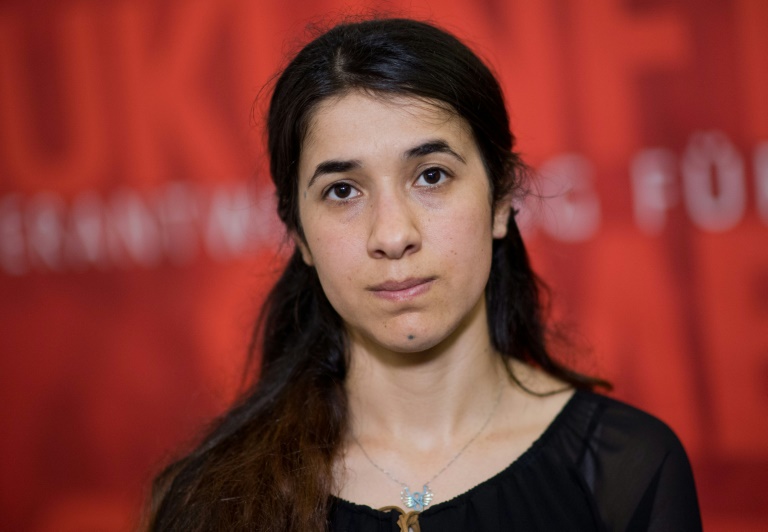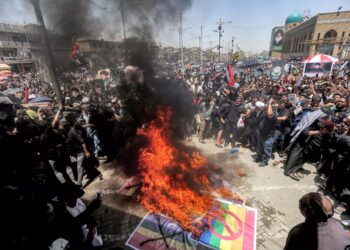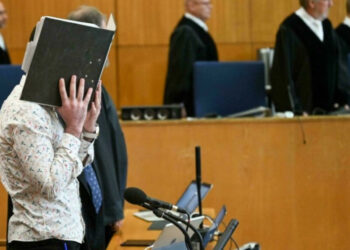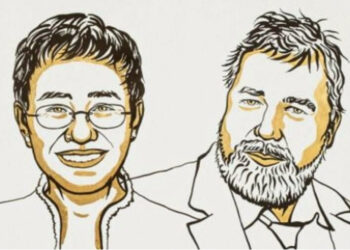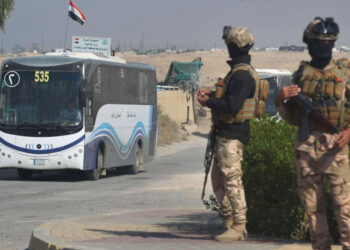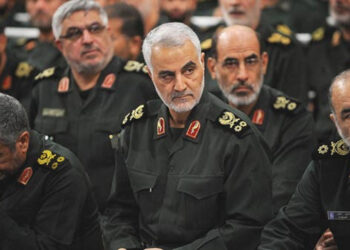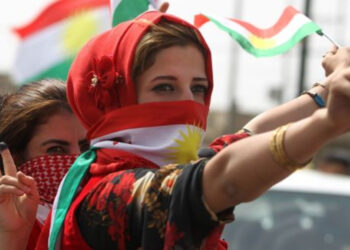Yazidi activist Nadia Murad, a survivor of Islamic State sex slavery, implored the global community to help free hundreds of women and girls still held by the jihadists in her Nobel acceptance speech on Monday, saying the world must protect her people.
“The protection of the Yazidis and all vulnerable communities around the world is the responsibility of the international community,” Murad told the ceremony in Oslo.
The 25-year-old shares the Nobel Peace Prize with Congolese doctor Denis Mukwege, who has spent more than two decades treating appalling injuries inflicted on women in the Democratic Republic of Congo’s war-torn east.
Nobel committee chairwoman Berit Reiss-Andersen said the pair were “two of the strongest voices in the world today.”
“The fight for justice unites them, despite their very different backgrounds,” she said on Monday.
IS Atrocities
Murad wept during Reiss-Andersen’s description of the suffering of her people. She survived the horrors of captivity under the Islamic State group, which targeted her Kurdish-speaking community as it seized parts of Iraq and Syria.
Older women and men faced summary execution during the IS assault, which the United Nations has described as a possible genocide.
Captured in 2014, Murad suffered beatings and gang-rape before she was able to escape.
In her Nobel acceptance address, Murad said more than 6,500 women and girls from her community had been kidnapped, raped and traded “in the 21st century, in the age of globalization and human rights.”
The fate of some 3,500 people, predominantly women and girls, is still unknown.
“Young girls at the prime of life are sold, bought, held captive and raped every day. It is inconceivable that the conscience of the leaders of 195 countries around the world is not mobilized to liberate these girls,” she said.
“What if they were a commercial deal, an oil field or a shipment of weapons? Most certainly, no efforts would be spared to liberate them.”
Murad, whose mother and six of her brothers were killed, said on Sunday that “steps towards justice” had given her some hope.
A U.N. team authorized to investigate the massacre of the Yazidi minority is due to finally start fieldwork in Iraq next year.
Murad has been supported in her campaign for justice for Yazidis by Lebanese-British lawyer and rights activist Amal Clooney, who was in the audience in Oslo.
No jihadist has yet faced trial over the atrocities against the Yazidis.
Murad is the first Iraqi to win the Nobel Peace Prize.
She said she was thankful for the honor, but added: “The fact remains that the only prize in the world that can restore our dignity is justice and the prosecution of criminals.”
Situation on the Ground
Around 200,000 Yazidis still remain displaced, with hundreds of thousands living in displacement camps scattered across Iraq’s northern Kurdistan region.
Sinjar, which is the name of both a city and a district in Iraqi Kurdistan, was once home to a large Yazidi population. But around 70 percent of buildings there were damaged or destroyed during the operations to retake it from IS. Today, Sinjar is still a ghost town.
Tom Peyre-Costa, Norwegian Refugee Council’s (NRC) media coordinator in Iraq, told The Globe Post that Iraqi authorities cannot afford to rebuild the city – they don’t have the needed resources.
At the moment, NRC is the only NGO with the permanent presence in Sinjar. It helps the Yazidis on multiple fronts, including with legal assistance. The organization also provides vocational training to the local youth teaching them how to do mobile phone maintenance, for example, so that they are able to get jobs.
Yazidis “cannot return home. They have no home to return to,” Peyre-Costa said. “Most of the houses are destroyed, they are flattened, and under the rubble, there are bodies and explosive remnants.”
As Murad was honored with the Nobel Prize, U.N. Children’s Fund (UNICEF) specifically underscored the plight of hundreds of thousands of internally displaced children in Iraq.
“As the world celebrates Nadia Murad’s incredible story of survival and her work for human rights, let us remember that there are many vulnerable children in Iraq who still need our support, even if the worse of the violence may be over,” said Peter Hawkins, UNICEF Representative in Iraq.
“The devastating floods have made this winter even more difficult for displaced children who are extremely vulnerable to hypothermia and respiratory diseases. No child should be subjected to such risks. Every child deserves to be warm and healthy,” Hawkins added.
‘Justice is Essential’
Peyre-Costa said there is a feeling among the Yazidis that they are being forgotten because three years on, “nothing has been done concretely to help them.”
In August, Executive Director of the Free Yezidi Foundation Pari Ibrahim said that if there is no justice, Yazidis will get revenge.
“I’ll tell you right now: Yazidis will commit murders. Because, if they have to live with the people who raped their daughters, who killed their fathers, who got away with these crimes, yes, justice is absolutely essential,” she said.
Peyre-Costa argued, however, that the international community sent a strong message to the Yazidis by nominating Murad for the Nobel Peace Prize.
“This message for me is pretty clear: it is that sexual violence in war is now being taken very seriously, and all the perpetrators will be held accountable,” he said, noting that the recent discovery of 200 mass graves left by IS shows that everyone is working hard to shed the light on what happened.
“There will be justice,” Peyre-Costa said. “I think seeking revenge by violence is never the answer. Dialogue, for sure, is the solution.”
Anna Varfolomeeva contributed reporting


